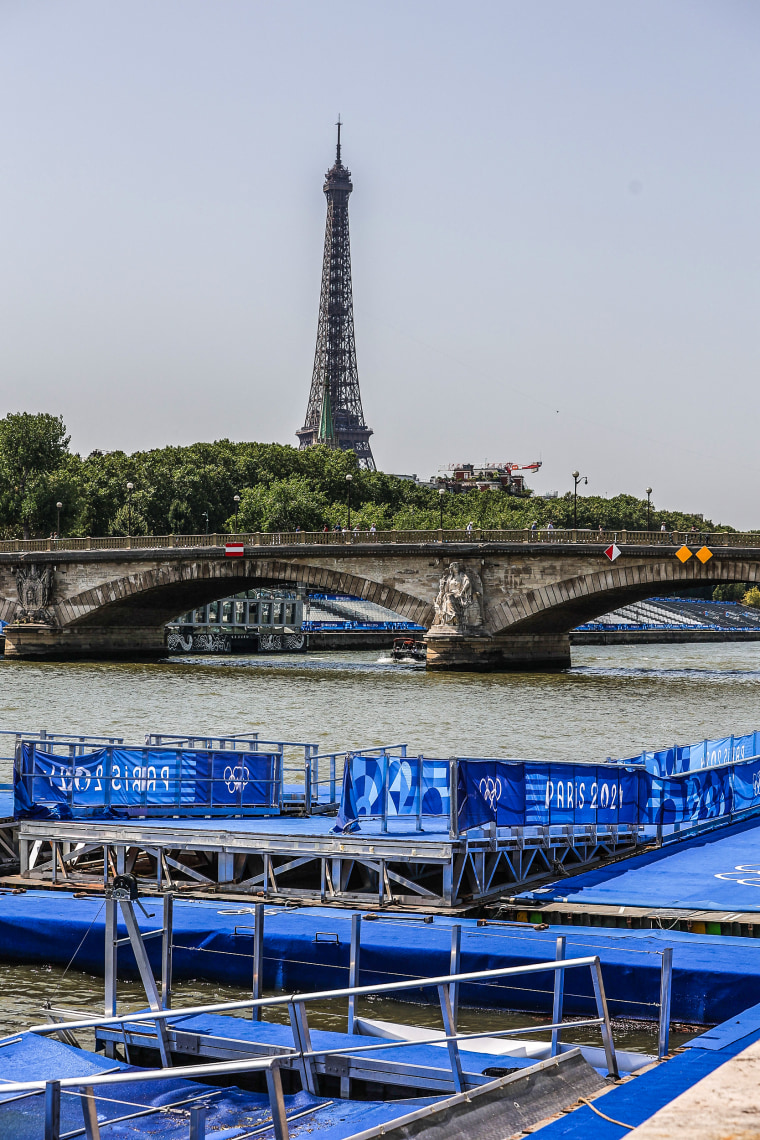After months of speculation about whether the Seine River would be clean enough for Olympic athletes to compete in it, officials deemed the water safe for swimming after a last-minute test.
The favorable test of the river’s water quality on Wednesday morning Paris time means the men and women will swim in back-to-back races as part of the triathlon, beginning at 8 a.m. local time. The men’s race had originally been scheduled for Tuesday, but it was postponed after the Seine failed water quality tests.
“The results of the latest water analyses, received at 3:20 a.m., have been assessed as compliant by World Triathlon allowing for the triathlon competitions to take place,” said a news release from Paris organizers and World Triathlon, the sport’s governing body.

After the race, Team USA triathlete Taylor Spivey said she swallowed “a ton of water” during the swimming leg of her triathlon event in the River Seine — a waterway that’s historically been so polluted that swimming in it was illegal for the past century.
Spivey, who finished 10th in the race, told NBC News that her main concern was not the quality of the water, however, but the “insane” and “shocking” strength of the current, which she said was so strong that she felt the race could have been called off.
“That current — wow,” she said. “I felt like I was on a treadmill in one place.”
Asked about the water quality, she added, “I’ve taken a lot of probiotics over the past month. So we’ll see how it goes.”
France’s Cassandre Beaugrand picked up the gold medal ahead of Switzerland’s Julie Derron, who won silver. Beth Potter of Great Britain took the bronze.
Water quality in the Seine became something of a saga leading up to the Games, as organizers raced to prepare the polluted waterway for prime-time attention. For months, the French have been testing river samples for E. coli and Enterococci bacteria, which are indicators of fecal matter, as well as other pathogens. When E. coli levels are high, swimmers risk developing gastrointestinal illness.
The Seine had been failing those tests after rainy weather, because storms can send runoff, and sometimes sewage, into the river.
Swimming had been disallowed on the Seine for more than a century because it was too polluted, but the city of Paris led a $1.5 billion effort to clean up the river and shore up waste treatment systems in the lead-up to the Olympics.
As the first events approached, organizers had hoped for clear, sunny weather to reduce overall pollution and allow ultraviolet light to inactivate some bacteria.
But the weather has rarely cooperated.
Last year, some test events to rehearse the triathlon were canceled because of water quality concerns after rainfall.
Then the opening ceremony, which involved a boat parade on the Seine, took place amid some downpours Friday, and the showers lasted into Saturday.
The rain caused pollution and forced organizers to cancel two days of swim training Sunday and Monday. Then they postponed the men’s triathlon, which was originally scheduled for Tuesday morning.

“I’m just trying to focus on what I can control,” Kirsten Kasper, an American triathlete, told NBC News on Tuesday. “We swim in a lot of city locations, and it’s common for water quality to be a question. But I just have to trust that the race organizers are doing the testing and what they need to do to make sure it’s safe.”
Water quality experts said the difficulties ensuring the Seine was sufficiently clean could draw needed attention to broader issues of environmental contamination, which are common worldwide.
“It’s just very hard to manage, in large cities, the amount of human waste that we see,” said Katy Graham, an assistant professor at Georgia Tech’s College of Engineering. “The public thinks a lot of these issues have been completely solved. They’re most certainly not.”
NBC News is a division of NBCUniversal, which owns the U.S. media rights to the Olympic Games through 2032, including the 2024 Paris Games, which begin on July 26.
Evan Bush reported from Seattle and Alexander Smith reported from Paris.





















